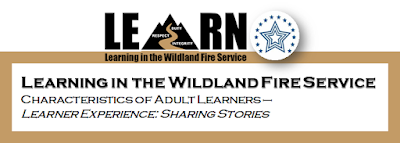“All history is remembered history. The action of the individual only gains historical significance through individual relation to the life of a social group.” - Paul Tillich, ‘Theology of Peace’
Giving veterans of a fire the opportunity to share their learning experiences with others brings healing to the entire community.
The telling of stories about individual and collective experience is one of the most impactful additions to any learning environment. Through the telling of stories, individual and collective learning and healing occurs as memories are physically recreated in the mind of each learner.
Instructional techniques that can be used to capitalize on student experiences and storytelling include: problem solving, case studies, small and large group discussions, role-playing, staff rides, and simulation exercises.
The telling of stories about individual and collective experience is one of the most impactful additions to any learning environment. Through the telling of stories, individual and collective learning and healing occurs as memories are physically recreated in the mind of each learner.
Instructional techniques that can be used to capitalize on student experiences and storytelling include: problem solving, case studies, small and large group discussions, role-playing, staff rides, and simulation exercises.
- Effective questioning techniques provide one method to uncover student experiences that may have a bearing on a lesson. Allow students to provide real-world examples to help anchor and solidify instruction.
- Group and individual projects involving real-world problems can be used to allow students to apply what they have learned and to hone their problem-solving skills.
- Exposure to multiple perspectives and experiences challenges students to question their previous assumptions. Learning is accomplished through the evaluation of differing experiences, judging best and worst practices, and creating synthesis born of collective experience.

No comments:
Post a Comment